Are you a dental professional in Florida seeking to acquire or renew your license with the Florida Board of Dentistry? You’ve come to the right place.
The Florida Board of Dentistry is the regulatory authority responsible for the licensure and oversight of dental professionals in the state, including dentists, dental hygienists, and dental assistants.
Its primary objective is to ensure that these professionals meet the necessary qualifications to provide safe and competent dental care services.
In this article, we’ll explore the board’s processes for license renewals, application evaluations, and credential verifications. Additionally, we’ll discuss how Heartbeat AI can simplify these procedures, making them more efficient for dental professionals.
Let’s start!
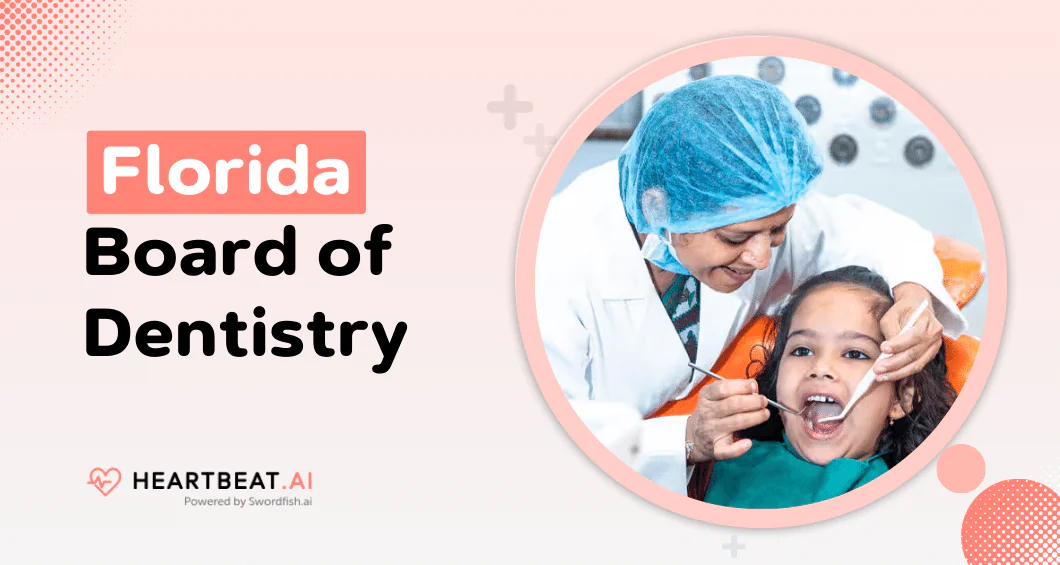
What’s on this page:
Florida Board of Dentistry: At A Glance
The Florida Board of Dentistry is responsible for regulating and overseeing the licensure of dentists, dental assistants, and hygienists in Florida. This board ensures that dental professionals meet strict standards to provide safe and effective care to the public.
Key responsibilities of the board include granting licenses, monitoring the fulfillment of continuing education, enforcing compliance with dental practice standards, and disciplining those who fail to comply with regulations. The board also addresses complaints and implements regulatory changes as needed.
Contact Information
- Address: Florida Board of Dentistry, 4052 Bald Cypress Way, Bin C-08, Tallahassee, FL 32399-3258
- Phone: (850) 245-4474
- Website: Florida Board of Dentistry
What is the Florida Board of Dentistry Responsible for?
Here’s an overview of the specific responsibilities of the Florida Board of Dentistry:
- Licensing: The board issues licenses to dentists and dental hygienists after verifying that they meet the educational, examination, and ethical standards required by the state. It also handles the licensing of dental laboratories.
- Regulation and Enforcement: The board sets and enforces standards for the practice of dentistry and dental hygiene. It defines the scope of practice for these professionals and ensures compliance with state laws and regulations. This includes the authority to investigate complaints and conduct hearings.
- Disciplinary Actions: The board has the power to impose disciplinary actions against dental professionals who violate professional standards or legal requirements. This can include fines, suspension, probation, or revocation of licenses.
- Public Safety and Protection: One of the primary roles of the board is to protect the health and safety of the public by ensuring that only qualified and competent dental professionals practice in Florida. It also provides a channel for patients to submit complaints against dental practitioners.
Florida Board of Dentistry Lookup
To verify the license status of a dentist in Florida, you can utilize the official online portal provided by the Florida Department of Health. This platform allows users to search for dental professionals by name or license number, providing crucial information such as license validity, renewal dates, and any disciplinary actions taken against the practitioner.
This resource ensures that patients can confirm the credentials of their dental care providers, maintaining high standards of professional accountability in Florida.
For a more streamlined verification process, consider using Heartbeat AI, which provides efficient access to updated licensing information.
Florida Board of Dentistry License Requirements
Here are the license requirements for dentists in Florida:
- Minimum age of 18 years.
- Completion of a dental program accredited by the Commission on Dental Accreditation (CODA).
- Passing scores on the National Board Dental Examinations (NBDE) Part I and Part II.
- Dental Hygienists need to pass the National Board Dental Hygiene Examination (NBDHE).
- Successful completion of the Florida Laws and Rules Examination.
- Successful completion of a Florida Board-approved clinical examination.
- Submission of an application along with the required fee to the Florida Board of Dentistry.
- Completion of a criminal background check.
- Proof of current CPR certification from an approved provider.
- Completion of a two-hour course on the prevention of medical errors.
How to Get a Florida Board of Dentistry License
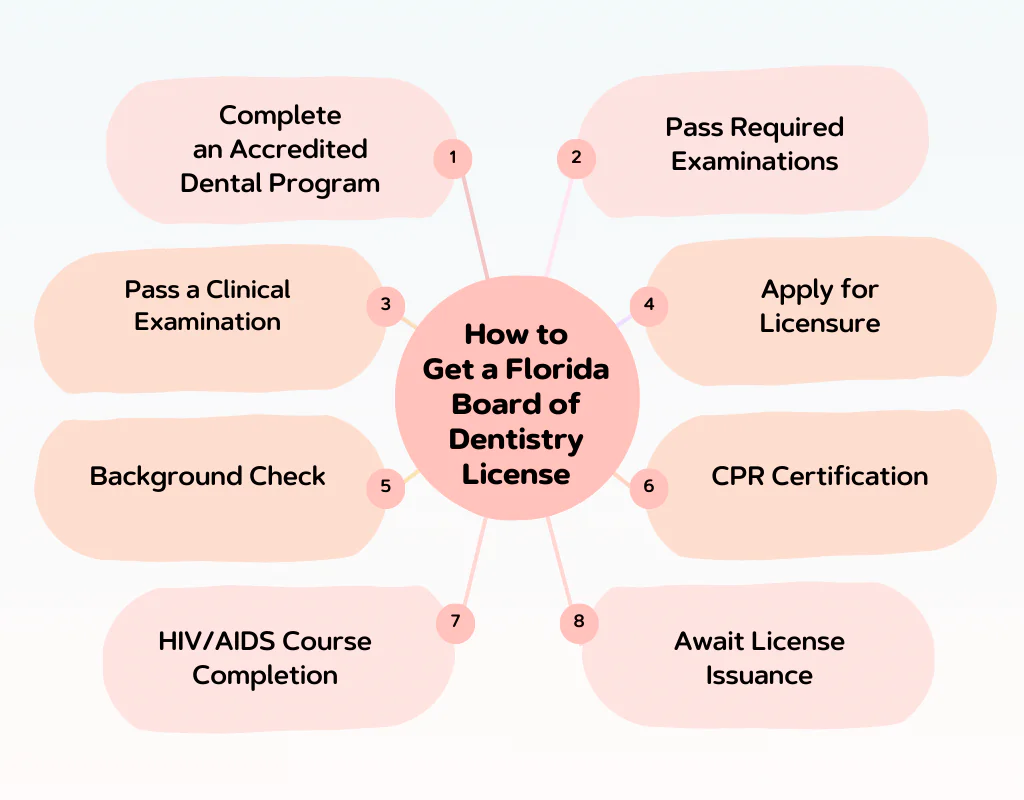
To obtain an FL Board of Dentistry License, you can follow these steps to ensure you meet all the necessary requirements and successfully navigate the licensing process:
Step 1: Complete an Accredited Dental Program
Enroll in and graduate from a dental program that is accredited by the Commission on Dental Accreditation (CODA). This program should include both academic and clinical training in dentistry.
Step 2: Pass Required Examinations
Successfully pass the National Board Dental Examinations (NBDE), Part I and Part II, or the Integrated National Board Dental Examination (INBDE). In addition to these national exams, you must pass the Florida Laws and Rules Examination, which covers the specific laws and regulations pertaining to dental practice in Florida.
Step 3: Pass a Clinical Examination
Complete a state-approved clinical examination. In Florida, this is typically the American Board of Dental Examiners (ADEX) Dental Licensing Examination administered by the Commission on Dental Competency Assessments (CDCA) or another board-approved clinical exam.
Similarly, dental hygienists in Florida must successfully pass the ADEX Dental Hygiene Examination administered by the CDCA, or another equivalent examination approved by the board.
Step 4: Apply for Licensure
Submit an application for licensure to the Florida Board of Dentistry. Include all necessary documentation, such as proof of graduation from an accredited dental school, exam scores, and the required application fees.
Step 5: Background Check
Undergo a background check, which includes submitting fingerprints. This step is mandatory for all healthcare professionals applying for licensure in Florida and helps ensure the safety and integrity of the profession.
Step 6: CPR Certification
Obtain and maintain a current Basic Life Support (BLS) for Healthcare Providers certification from an approved provider. This certification is a requirement for licensure and must be kept up to date.
Step 7: HIV/AIDS Course Completion
Complete a board-approved course in HIV/AIDS, typically two hours long, as part of the licensing requirements. This educational requirement helps ensure that dental professionals are knowledgeable about handling and preventing HIV/AIDS in a healthcare setting.
Step 8: Await License Issuance
Once your application is reviewed and approved, and all examinations and background checks are successfully completed, the Florida Board of Dentistry will issue your license to practice dentistry in Florida.
Florida Dentistry Board Licensure Time Frame
Once your licensure application is approved by the Florida Dentistry Board, your license number will be issued within five to seven business days. The overall licensure process can vary, typically depending on the completeness of your application, any additional information required, and the frequency of the Board’s meetings.
Cost of Florida Dentistry Board License
The Florida Dentistry Board outlines the total cost of obtaining a dentistry license as $405.00. This total includes two components: an application fee of $100.00 and a licensure fee of $305.00. Applicants have the flexibility to make payments online, or they can opt to pay via certified check or money order, which should be made payable to the Florida Department of Health.
Florida Board of Dentistry License Renewal
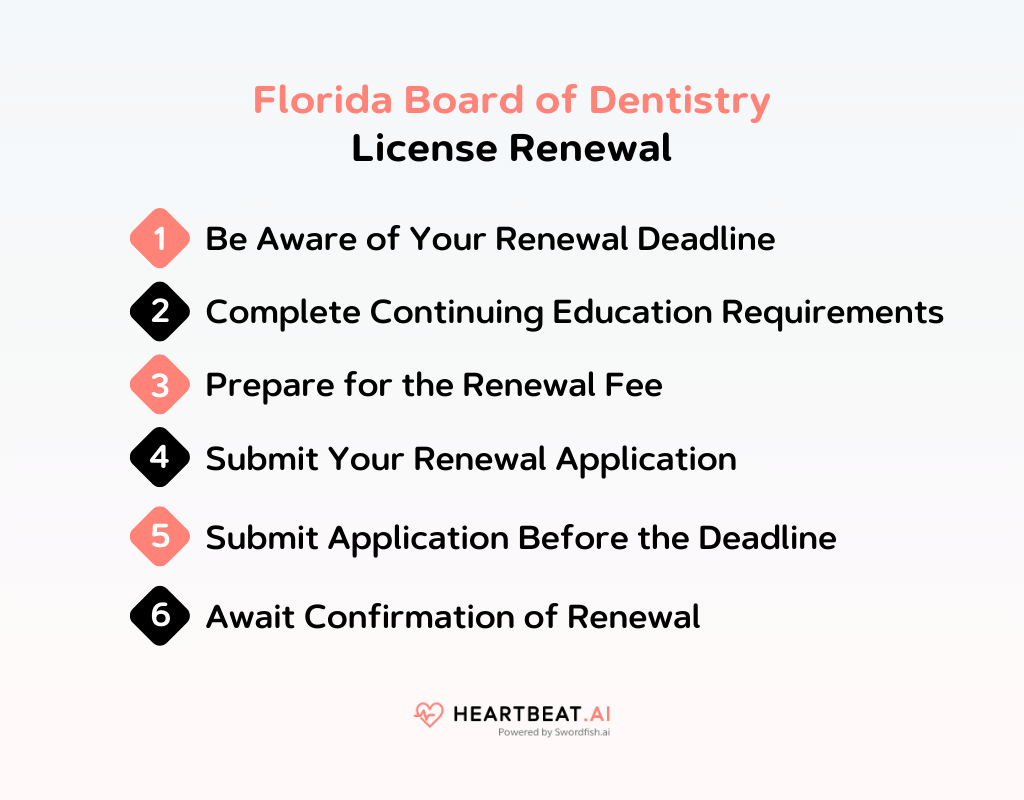
Renewing a dental license in Florida is a structured process that ensures all practicing dentists meet the state’s ongoing requirements. Here’s a step-by-step guide to help you renew your dentistry license in Florida:
Step 1: Be Aware of Your Renewal Deadline
In Florida, dental licenses must be renewed biennially by February 28th of even-numbered years. It’s essential to keep track of this deadline to avoid any lapse in licensure, which could impact your ability to practice.
Step 2: Complete Continuing Education Requirements
Continuing education (CE) is mandatory for license renewal. Florida dentists are required to complete 30 credit hours of continuing education every two years. This includes a mandatory 2-hour course on the prevention of medical errors and a domestic violence course every third renewal period.
Specific courses such as HIV/AIDS education may also be required for first-time renewers. The Florida Board of Dentistry’s website provides detailed information about these requirements.
Step 3: Prepare for the Renewal Fee
The renewal fee for dentists in Florida can vary, so it’s advisable to check the most current fee directly on the Florida Board of Dentistry’s website or contact them for up-to-date information.
Step 4: Submit Your Renewal Application
The renewal application can typically be completed online through Florida Health’s online portal for health licensing. Ensure all your personal and professional details are current and correctly entered.
Step 5: Submit the Application Before the Deadline
Avoid late fees and ensure there are no disruptions in your practice by submitting your completed application and the required fee before the license expiration date of February 28th in even-numbered years.
Step 6: Await Confirmation of Renewal
Once your application is submitted, you can usually track its status online. The Florida Board of Dentistry will notify you once they have processed your renewal, securing your licensure for another two-year term.
Florida Board of Dentistry License Verification
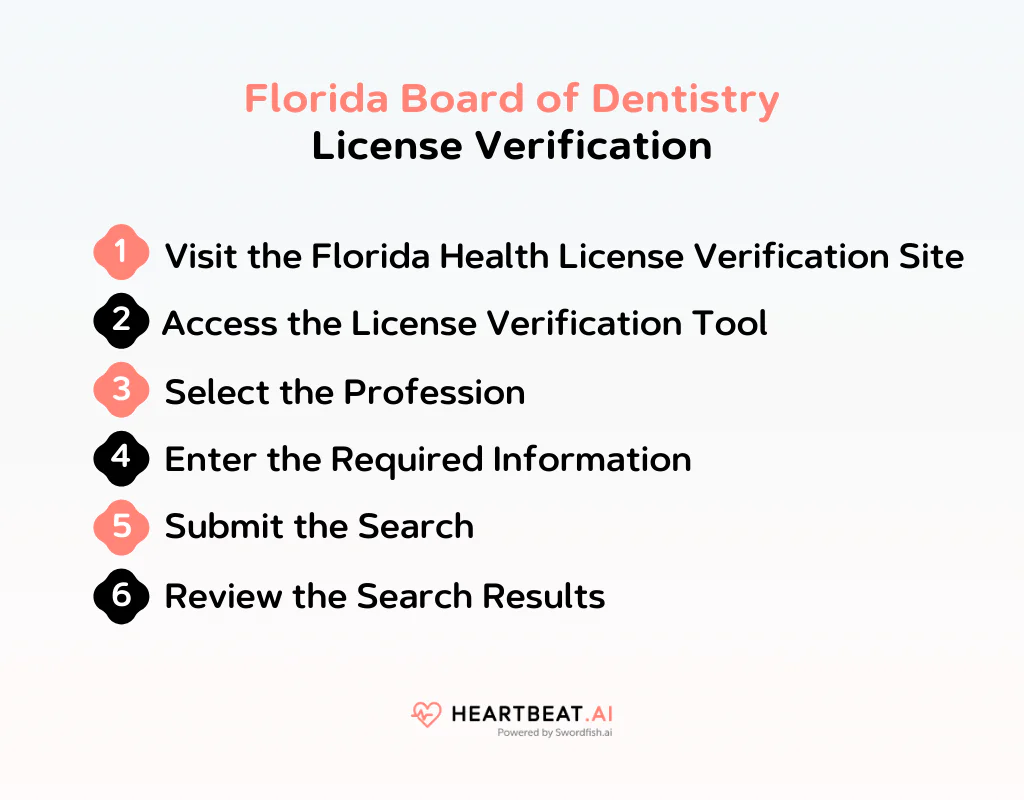
Verifying a dental license in Florida can be completed through a straightforward online process provided by the Florida Department of Health. Here’s a step-by-step guide on how to verify a dental license in Florida:
Step 1: Visit the Florida Health License Verification Site
Start by navigating to the official website of the Florida Department of Health. Specifically, you’ll want to access the License Verification page, which is part of the Medical Quality Assurance (MQA) Services system.
Step 2: Access the License Verification Tool
Look for the section or link labeled “Verify a License” or “License Verification.” This option is typically prominent on the site, as it’s a commonly used service.
Step 3: Select the Profession
You will need to select the appropriate profession from the dropdown menu. For dental licenses, you can choose categories like “Dentist,” “Dental Hygienist,” or “Dental Assistant,” depending on whose license you need to verify.
Step 4: Enter the Required Information
Input the necessary details for the search. This typically includes the licensee’s name or license number. Make sure the information entered is accurate to facilitate an effective search.
Step 5: Submit the Search
Click on the search button to execute your query. The system will process your request and search the Florida Department of Health’s database for the relevant information.
Step 6: Review the Search Results
The search results will display information such as the licensee’s name, license number, primary practice location, license status (active, inactive, delinquent, etc.), and expiration date. It may also provide details on any disciplinary actions or public complaints.
How Often Do Dentistry Licenses Need to be Renewed in Florida?
In Florida, dentistry licenses need to be renewed biennially. The renewal deadlines are segmented by the type of practice: Dentists must renew their licenses by the end of February in even-numbered years, while dental hygienists have a renewal deadline at the end of February in odd-numbered years.
During the renewal process, both dentists and dental hygienists are required to complete continuing education (CE) requirements. The specific number of CE hours and topics are mandated by the Florida Board of Dentistry.
Required topics include domestic violence, HIV/AIDS, and medical error prevention, ensuring that practitioners remain knowledgeable and compliant with state laws and industry best practices.
How Does Heartbeat AI Simplify the Process of Getting & Renewing a Dentistry License in Florida?
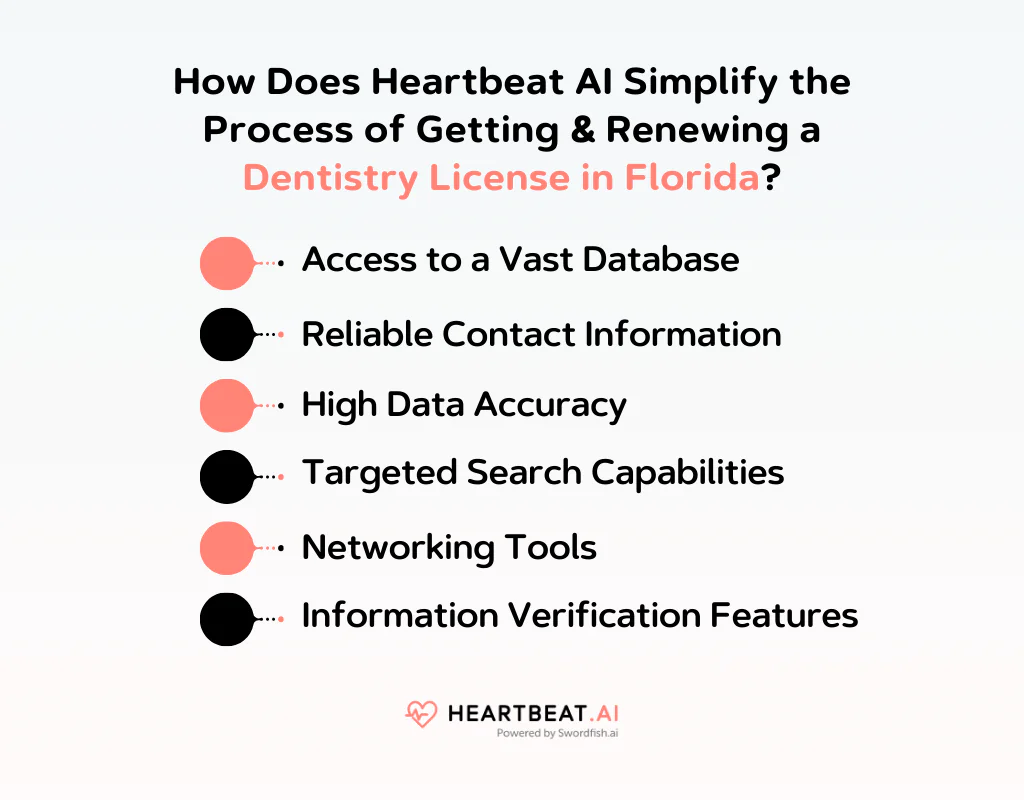
Heartbeat AI can effectively simplify the process of obtaining and renewing a dentistry license in Florida through its advanced data management tools and comprehensive database.
Here are some other features of Heartbeat AI:
Access to a Vast Database
Heartbeat AI offers access to an expansive database, enabling users to efficiently pull a broad spectrum of information. This extensive database is crucial for professionals looking to rapidly access detailed information across diverse sectors, thereby boosting research capabilities and aiding in informed decision-making based on comprehensive data analysis.
Reliable Contact Information
The platform provides contact information sourced from over 200 trusted providers, ensuring that the contact details are accurate and up-to-date. This includes access to verified email addresses and phone numbers.
High Data Accuracy
Heartbeat AI places a strong emphasis on the precision of its data, ensuring that users receive only the most dependable information. This accuracy is vital for informed decision-making and upholding high professional standards. The platform’s thorough validation procedures reduce the likelihood of errors, giving users confidence in the reliability of the information they depend on.
Targeted Search Capabilities
Their Prospector Tool allows for efficient and precise searches within an extensive database, enabling users to locate specific information quickly. It is particularly useful for segmented data analysis, which is essential for targeted marketing campaigns and research projects. Moreover, the tool enhances lead generation by pinpointing relevant contacts and business opportunities.
Networking Tools
The platform’s Chrome Extension and other networking features enable dentists to connect with peers who have navigated the licensing process in Florida. This can be a valuable resource, providing insights and advice on best practices for dealing with the Florida Board of Dentistry, as well as tips for successful license application and renewal.
Information Verification Features
The Heartbeat AI Chrome Extension flawlessly melds with your Chrome browser, offering straightforward access to its functions while you continue with your online activities. It provides real-time access to data and automates routine tasks directly within the browser to streamline your workflow. Additionally, the extension delivers personalized notifications to keep you updated on crucial deadlines and tasks.
Conclusion
To summarize, we examined the vital role the Florida Board of Dentistry plays in regulating dental practices across the state. For dental professionals operating in Florida, following the board’s rules and guidelines is key to keeping an active license and delivering quality oral healthcare.
If you need an easy way to find and connect with licensed Florida dental professionals, Heartbeat AI provides a useful solution. Heartbeat AI simplifies verifying licensure status.
FAQs
What are the legal consequences of practicing dentistry without a license in Florida?
Practicing dentistry without a license in Florida is illegal and considered a felony. The consequences of this offense can include significant fines and possible imprisonment. This action is taken seriously to protect public health and ensure that only qualified and licensed professionals provide dental care.
How can I file a complaint against a dental professional in Florida?
To file a complaint against a dental professional in Florida, you should contact the Florida Board of Dentistry. Typically, there is a complaint form available on their website which you can fill out and submit. The board reviews all complaints and conducts investigations where appropriate to ensure compliance with dental practice standards.
What should I do if my dental license is lost or stolen in Florida?
If your dental license is lost or stolen in Florida, you should immediately notify the Florida Board of Dentistry. You will likely need to complete certain forms and may be required to pay a fee for a duplicate license. It’s important to handle this promptly to avoid any issues with your legal ability to practice.

